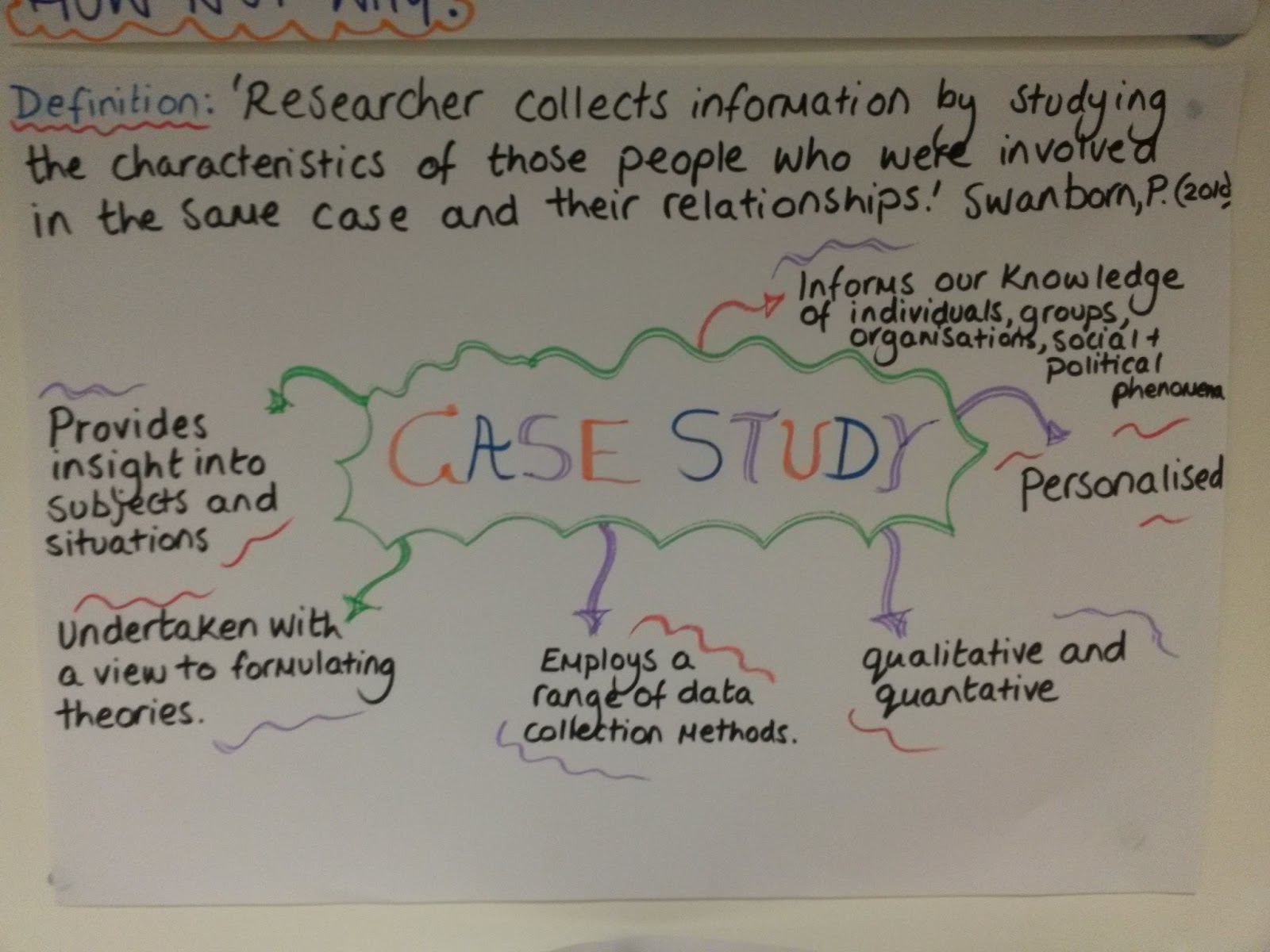Last week my students developed their understanding of case study. I asked them to do some independent reading and in their taught sessions I provided them with a range of sources which attempted to define the research approach. They were to identify key themes and characteristics of case study... I then gave them just ten minutes to create one-minute presentations for their peers.
Here is a sample of the work they produced to support their presentations. (Click on an image to enlarge it.):
Showing posts with label observation. Show all posts
Showing posts with label observation. Show all posts
18 January 2015
28 November 2014
...Defining Case Study Research
Definitions of case study research design are as numerous as the books written on the subject. This post aims to draw together some key definitions of case study research, in an attempt to clarify the aims and purposes of this approach to social inquiry. As usual, I also share a reference list including suggestions of recommended sources for further information.
06 February 2014
...Interview Day
 I have recently received a flurry of emails asking me for advice about impending job interviews. Of course, since these emails have been from teachers in training they are having to consider not only the traditional face-to-face discussion of knowledge, understanding and skills, but also the prospect of teaching an observed 'demo' lesson. So here are some brief thoughts for teachers approaching the inevitable interview day.
I have recently received a flurry of emails asking me for advice about impending job interviews. Of course, since these emails have been from teachers in training they are having to consider not only the traditional face-to-face discussion of knowledge, understanding and skills, but also the prospect of teaching an observed 'demo' lesson. So here are some brief thoughts for teachers approaching the inevitable interview day.14 January 2014
...The Havering-UEL ICT Partnership
I'm currently sitting in the ICT suite of Mawney Foundation Primary School during a school-based training day for trainee teachers. I'm surrounded by trainees from the University of East London (UEL) busily planning the lessons they're due to teach after lunch. There's a great sense of enthusiasm and some fabulous ideas are being developed. It's an example of the good that can come from schools and universities working in partnership in the development of new teachers. This post describes some features and benefits of this teacher training model, developed between UEL and four schools in the east London borough of Havering.
Labels:
commitment,
education,
ethos,
experience,
experts,
funding,
ICT,
learning,
observation,
planning,
school,
schools,
teaching,
technology,
understanding,
vision
08 December 2013
...Beating Stress
 |
| Photograph: Alamy |
It's the nature of the job, isn't it? Inspections, ever-increasing expectations, and so many tasks to juggle, including planning, assessment, reporting and resourcing... The pressures on teachers, which seem relentless at times, amount to a genuine occupational hazard.
The pressures of the PGCE in particular are widely recognised. The learning curve is very steep for most trainees. The regular observations of your teaching practice, and the need for getting to grips with the necessary theory, subject knowledge, tasks and assignments make for a highly demanding 11 months. Current fee arrangements serve to add an unfortunate level of jeopardy for many.
It is with this in mind that Nane Steinhoff's blog in The Guardian caught my eye. Now, I know that dealing with stress is far from simple, and that a handy list of prompts is unlikely to be of any help for sufferers with acute symptoms. But, I shared the blog with a small group of trainees and it seemed to resonate. So, here it is - reblogged:
01 December 2013
...Demo Lessons
I have written this post with pre-service trainee teachers in mind... Naturally, a key consideration for you during your training is likely to be one of securing a job (and a salary) by the end of it. However, as one might expect, many head teachers are reluctant to recruit new staff without first seeing them teach.
 And rightly so. Recruitment itself takes time and money. And the stakes are high for school leaders for whom the quality of teaching is usually a prime concern.
And rightly so. Recruitment itself takes time and money. And the stakes are high for school leaders for whom the quality of teaching is usually a prime concern.
Also, teaching is a complex, dynamic profession. It requires intelligent, flexible, responsive individuals to make effective use of a range of strategies for ensuring that the pupils in their classes make progress. By observing you teach a lesson, and witnessing your practical abilities, a potential employer is in a much stronger position to confidently make you a job offer.
 And rightly so. Recruitment itself takes time and money. And the stakes are high for school leaders for whom the quality of teaching is usually a prime concern.
And rightly so. Recruitment itself takes time and money. And the stakes are high for school leaders for whom the quality of teaching is usually a prime concern. Also, teaching is a complex, dynamic profession. It requires intelligent, flexible, responsive individuals to make effective use of a range of strategies for ensuring that the pupils in their classes make progress. By observing you teach a lesson, and witnessing your practical abilities, a potential employer is in a much stronger position to confidently make you a job offer.
Labels:
first post,
grade,
job,
judgement,
learning,
NQT,
NQT year,
observation,
observer,
Ofsted,
organisation,
performance management,
planning,
progress,
recruitment,
teacher,
teaching,
teaching post
Subscribe to:
Posts (Atom)

